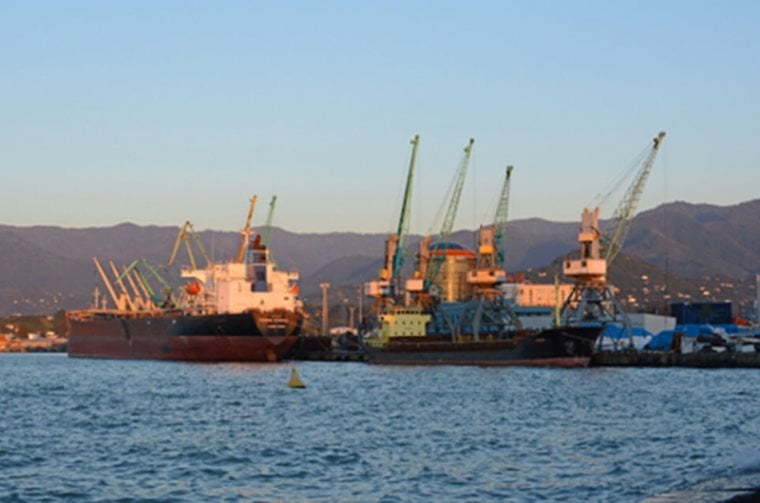The history of Batumi Seaport dates back to 1878, when it was granted the status of Porto Franco (free port). At the time, there were some very prominent entrepreneurs operating in Batumi, including the Rothschilds, the Nobels and Mantashevs.
The Nobel brothers owned oil deposits, dozens of oil refineries, oil tankers, barges, railways and hotels. In 1878, the ‘Nobel Brothers Oil Industry Fellowship’ was founded in Baku, which transported oil from Baku to Europe via Batumi Seaport. In 1883, the Nobel brothers built an oil terminal in Batumi. Construction of the Baku-Tbilisi-Batumi railway line was completed in the same year. In 1892, ‘Murex’, the first British tanker dropped its anchor in Batumi seaport. The tanker was designed especially for transporting Caspian oil from Batumi Seaport.
During the Soviet period, Batumi Seaport was granted the first category, and starting in 1967, it had the capacity to receive cargo ships. The contemporary history of Batumi Seaport starts in 2008 – after Batumi Seaport was transferred to the JSC KazTransOil-owned Batumi Oil Terminal Ltd. for long-term exploitation.
At present, the city of Batumi is one of the most important logistics hubs in the Caucasus, and because of it, the cargo turnover at Batumi Seaport has increased significantly, and is one of the largest transit points for general, dry, liquid and bulk cargo.
Batumi Seaport is not only the main sea gate of Georgia, but its stable operations determine the economic development of the Autonomous Region of Adjara, as well as the entire country. Thanks to its strategically important location and diverse infrastructure, Batumi Seaport has become a major transportation destination, making huge contributions to the geo-economic development of the country.
It is also important to mention the fiscal effect of Batumi Seaport, since it makes a significant contribution to the state budget. At the same time, Batumi Seaport is a major employer in the Adjara region. The seaport specializes in the transshipment of a wide range of cargo consignments. The seaport is the deepest along the east coastline of the Black Sea and it represents a transportation hub that can accommodate seaborne, railway and land transportation means. Today, the total area occupied by Batumi Seaport spans 22 hectares, and this area accommodate five terminals: oil, dry cargo, container, passenger and railway ferry terminals. The oil terminal is run by the Batumi Oil Terminal Ltd, the container and railway ferry terminals are managed by the Batumi International Container Terminal Ltd, and the dry cargo and railway
Commercial oil production at the giant Kashagan field in Kazakhstan was launched on November 21. It is estimated that the Kashagan’s output this year will be 1.1 million tons and approximately 4-8 million next year. You are probably wondering why this is such important news for Georgia? That’s because Batumi Oil Terminal is run by a Kazakh company, which wants Kashagan oil to pass through Batumi on its transit route.
Batumi Oil Terminal is the first oil transport asset of strategic importance owned by Kazakhstan.
At present, Batumi Terminal provides transshipment services for crude oil and oil products from Kazakhstan, Azerbaijan, Turkmenistan, Russia, Romania and other countries.
The Coordination Committee of the Trans-Caspian International Transport Route was set up with the purpose of attracting transit and foreign cargo to the Trans International Transport Route, implementing a coordinated policy for determining tariffs for cargo transportation, and increasing the efficiency of transport links. The main advantage of the transportation corridor is the ability to ship cargo from China to Europe in only 10-12 days.
According to the Director General of Batumi Oil Terminal Zhanat Kusianov, the Kazakh side has invested over $135 million in Batumi Oil Terminal and port since 2008. This investment has made a significance improvement in the technical and operational capabilities of unloading dry, general, liquid and bulk cargo.
Specifically:
• The open storage area for bulk cargo discharge has increased by 5,000 square meters.
• Capital repair work on the No. 10 passenger terminal has been carried out.
• Capital repair work of the dry cargo and passenger terminals No. 9 and No. 11 are underway.
• Replacing the old power system of the port, which was built in 1974, with modern equipment.
• Owing to the purchase of new portal cranes with the capacity of 18- 20-32(36) tons and the capital repairs of the dry cargo terminal, the time required for serving large-capacity ships with 40-50 tons of dead weight has decreased from 8-9 days to 5-6 days. At the same time the throughput efficiency of No. 7 berth has increased from 700, 000 to 1,100 000 tons (57%).
• Reconstruction of the port railway lines and installation of the new cargo weighing scales has significantly decreased the time required for serving trains. The purchase of two large-capacity frontal forklifts has increased the speed of cargo discharge by 20% and the speed of cargo operations in storage areas by 10%.
Thanks to the annual capital investments, the throughput capability of Batumi Port has increased to 1.5-2 million tons of cargo per year. Risks related to emergency stops and throughput capabilities has been brought to a minimum.
THE ADVANTAGES OF THE BATUMI SEAPORT COMPARED TO OTHER SEAPORTS:
BATUMI SEAPORT:
• Batumi Seaport is the largest in Georgia in terms of cargo discharge.
• The design capacity of Batumi Seaport totals 15 million tons per year.
BATUMI OIL TERMINAL LTD.
• The Batumi Oil Terminal is the largest in Georgia in terms of its design capacity and quantity of berth constructions;
• The capacity of the Oil Terminal totals 12 million tons per year;
• In 2006, the total capacity of crude oil and oil products discharge was 11,575 000.
BATUMI INTERNATIONAL CONTAINER TERMINAL LLC.
• The container terminal has the highest wall (283 meters) and the deepest waters (12 meter depth) in Georgia.
• At the present moment, this is the only container terminal in Georgia that has storing areas and possesses transshipment equipment.
RAILWAY FERRY TERMINAL
• The busiest terminal in Batumi.
• During a six month period from 2015 to 2016, the ferry terminal has shown a record high number of entering ships for the past decade.
DRY CARGO TERMINAL
The largest deep-water dry cargo terminal in Georgia (No. 7 berth depth: 11, 7 meters). Berth No.7 serves large-capacity vessels, such as Handymax (DWT – 43,000 -50,000 tons).
MARINE PASSENGER TERMINAL
• The only passenger terminal in Georgia.
















